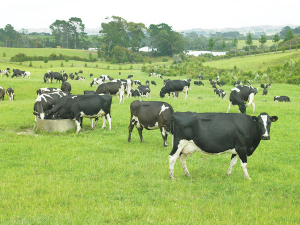Wired for Science: Understanding the feeding habits of mealybug
Fussy children might be frustrating, but fussy mealybugs could help protect the New Zealand wine industry from grapevine leafroll-associated virus 3.
 The research also showed that the low MUNBV cows also yielded an increase in milk protein percentage.
The research also showed that the low MUNBV cows also yielded an increase in milk protein percentage.
New research from Lincoln University has revealed that the genetic disposition of dairy cows could significantly reduce nitrate leaching.
Lincoln University’s Pastoral Livestock Production Lab found that grazing dairy cows with low milk urea nitrogen breeding values (MUNBV) have a 28% reduction in the urinary urea nitrogen loading rate per urine patch than cows with higher MUNBVs.
The lowest MUNBV animals in the study excreted 165.3 g less urinary urea nitrogen per day than the highest MUNBV animals.
As an example, at four cows per hectare, this difference equates to 241kg urinary urea less deposited onto pasture, resulting in 41kg less nitrate leached per hectare per year.
The research, completed by PhD student Cameron Marshall, also showed that the low MUNBV cows also yielded an increase in milk protein percentage.
Lincoln’s Professor of Livestock Production Pablo Gregorini says the findings are very significant for farmers and the entire agriculture sector.
“Cameron’s work shows that the cows themselves are an important tool in helping to cut nitrate leaching and nitrous oxide emissions, and in helping farmers meet their regulatory reductions. To be able to do this and increase milk protein at the same time is a huge win:win for the sector.
“Most farmers’ herds will naturally comprise a mixture of low MUNBV cows and higher MUNBV cows, with the trait being identified through testing the milk. Simply identifying the animals with low MUNBVs will enable famers to breed from their existing stock and change the makeup of their herd over time.”
Research into the differences between low MUNBV and higher MUNBV animals will continue, with Cameron Marshall studying the data to identify where further benefit-yielding research should be directed.
OPINION: "We are back to where we were a year ago," according to a leading banking analyst in the UK, referring to US president Donald Trump's latest imposition of a global 10% tariff on all exports into the US.
DairyNZ says the Government’s proposed Resource Management Act reform needs further work to ensure it delivers on its intent.
Overseas Trade Minister Todd McClay says he's working constructively with the Labour Party in the hope they will endorse the free trade agreement (FTA) with India when the agreement comes before Parliament for ratification.
Donald Trump's latest tariff tantrum has again thrown the world of trade into a new round of turmoil and uncertainty, and NZ is caught up in it.
The third edition of the NZ Dairy Expo, held in mid-February in Matamata, has shown that the KISS principle (keep it simple stupid) was getting a positive response from exhibitors and visitors alike.
Twenty years ago, South African dairy farm manager Louis Vandenberg was sent to a farm in Waikato to provide training on Afimilk technology.
OPINION: One of the world's largest ice cream makers, Nestlé, is going cold on the viability of making the dessert.
OPINION: Is it a case of over promising and under delivering? Farmers think so.